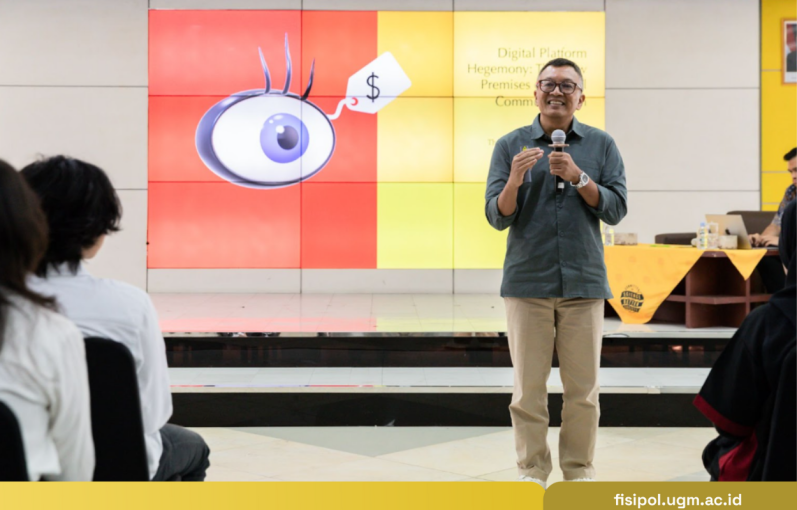
Yogyakarta, September 10th 2025 – The Master of Communication Science Program at Universitas Gadjah Mada (UGM) held a general lecture entitled “Digital Platform Hegemony and New Premises of Contemporary Communication Architecture” in the 4th Floor Auditorium of the Faculty of Social and Political Sciences (FISIPOL) UGM. The event featured Janoe Arijanto, Chairman of the Indonesian Advertising Companies Association (P3I), as the keynote speaker, with Benyamin Imanuel Silalahi, a doctoral student in Communication Science at FISIPOL UGM, as the moderator.
In his presentation, Janoe emphasized that the communications industry is currently dominated by global digital platforms such as Google, META, and TikTok. According to Janoe, in 2021, around 75 percent of communications or advertising spending in Indonesia will be allocated to these three platforms. This situation means that almost all modern communication channels are beyond their control.
“The world of communication is becoming increasingly mathematical and cybernetic. Unfortunately, we don’t have very strong data about who our audience is in real time. That data is completely controlled by the platform giants,” said Janoe in his presentation.
He emphasized that so far, the Indonesian government only has demographic data in the form of population numbers and distribution. However, behavioral data on Indonesian society is completely in the hands of global technology companies. This data imbalance, according to him, creates what is known as epistemic asymmetry, which is a fundamental difference in access to and control of knowledge.
Janoe detailed three major issues arising from the dominance of digital platforms. First, data extractivism, or the continuous exploitation of data through people’s willingness to share personal information. Second, epistemic asymmetry, where global platforms control data on the behavior of Indonesians, while the government and local industry do not. Third, algorithmic dependency, which is a high dependence on algorithms designed by global technology companies.
According to Janoe, this situation has caused domestic media to lose their direct connection with their audience. “Domestic media also use platforms to find out about their audience’s behavior. This shows that there is a distance or detachment between the media and their audience. Even more worrying is that the media is highly dependent on the indexing models of large platforms’ algorithms,” explained Janoe.
The dominance of global platforms over data and algorithms shows that Indonesia needs to build a robust national data infrastructure. Through this general lecture, the Master of Communication Science of UGM encourages students, academics, and communication practitioners to be critical of the realities of contemporary communication, while also seeking strategies to deal with the dominance of digital platforms. This is also an effort to encourage local digital communication innovation so that Indonesians are not merely users, but also managers of knowledge and technology.
